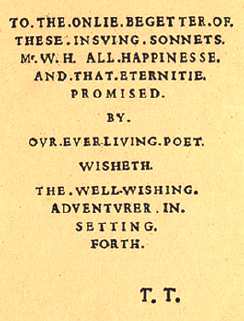An ambiguous dedication
Translation...
TO . THE . ONLY . BEGETTER . OF.
THESE . ENSUING . SONNETS.
Mr. W . H . ALL . HAPPINESSE.
AND . THAT . ETERNITIE.
PROMISED.
BY .
OUR . EVERLIVING . POET.
WISHETH.
THE . WELL-WISHING.
ADVENTURER . IN.
SETTING.
FORTH.
T. T.
The main candidates for "Mr. W. H." are:
- Henry Wriothesley, Earl of Southampton
-
[H. W. not W. H.? "Mr" not "Lord"?]
- William Herbert, Earl of Pembroke
-
["Mr" again.]
One way to clear away complicated speculation is to make the simple assumption that there is indeed a misprint in the dedication, and that it is "Mr W. S." --William Shakespeare--who is after all the "onlie begetter," or creator, of the sonnets; the word "begetter" in dedications of the period always refers to the author, rather than the source of inspiration*. Then again, this theory would do away with all of the entertaining speculation.
Footnotes
-
Begetters and typographical errors
An article by Donald Foster, who has developed a powerful computer database of Shakespeare's language, Shaxicon, establishes the conventional use of the word "begetter" in the period, and argues that "W. H." is a misprint: see Shakespeare Survey, 1987.
